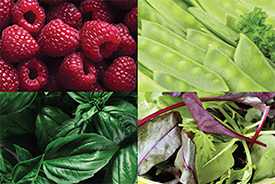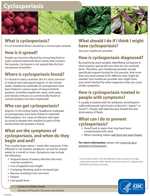Cyclosporiasis: Most U.S. cases reported in warmer months

Cyclosporiasis is an intestinal illness caused by the protozoan (unicellular) parasite Cyclospora cayetanensis.
Cyclosporiasis can occur at any time of the year, but most of the reported cases and outbreaks in the United States occur during spring and summer months, particularly during May through August. About half of all U.S. cases that are not associated with a known outbreak occur in people with a recent history of travel outside the United States and Canada.
Cyclosporiasis is acquired by eating food or drinking water that is contaminated with human feces. In the United States, cyclosporiasis outbreaks have been reported almost every year since the mid-1990s and have been associated with various types of imported fresh produce.
Symptoms of cyclosporiasis begin an average of seven days after ingestion of sporulated oocysts (eggs), the infective form of the parasite. The most common symptom is watery diarrhea. Other common symptoms include loss of appetite, nausea, abdominal cramps, weight loss, fatigue, and myalgia (muscle pain); vomiting and low-grade fever also may occur.
Cyclospora infection is diagnosed by examining stool. A special test is required to detect the parasite, so health care professionals should specifically request testing for Cyclospora. Patients might need to provide up to three stool samples collected on different days because even people who show symptoms might not shed enough oocysts in their stool to show up in laboratory testing.
Cyclosporiasis is treated with a common antibiotic. If the infection is not treated, symptoms can last for several weeks to a month or more. There is no vaccine for cyclosporiasis. People can lower the risk of getting cyclosporiasis by avoiding food or water that may have been contaminated with feces. Rinsing fresh produce can reduce—but may not eliminate—the chances of getting cyclosporiasis. Treating food or water with chlorine or iodine is unlikely to kill Cyclospora oocysts. Safe food and water habits are recommended when traveling.
- Page last reviewed: July 8, 2016
- Page last updated: July 8, 2016
- Content source:



 ShareCompartir
ShareCompartir